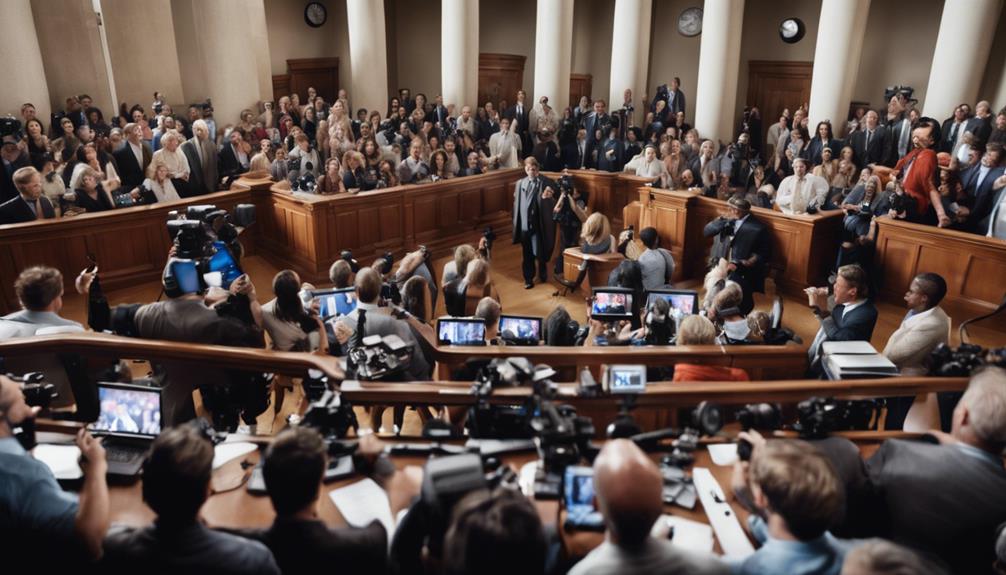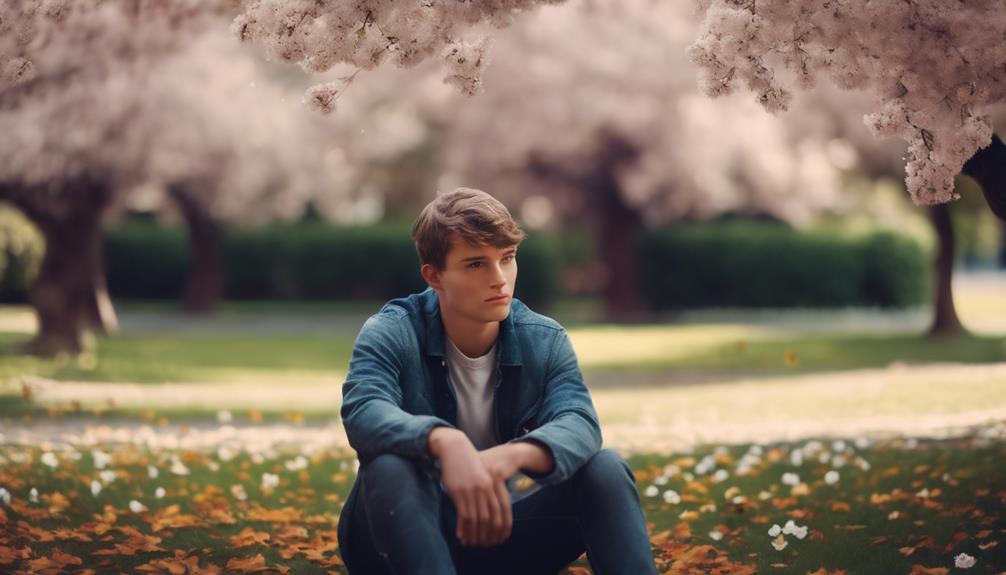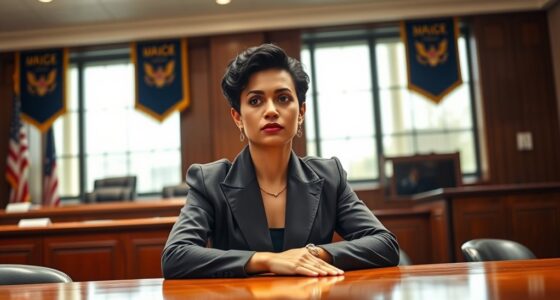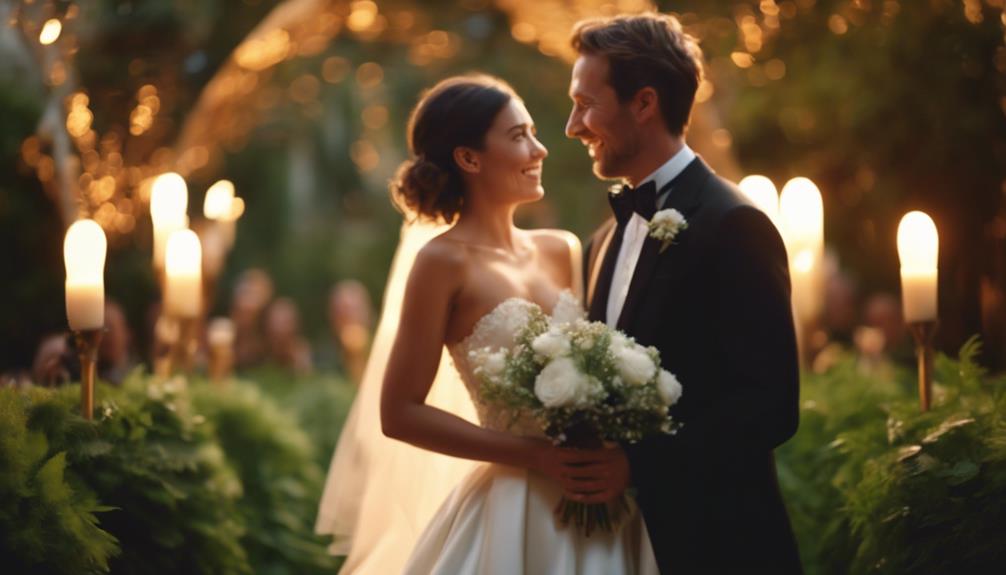Celebrity trials are often swayed by public opinion, which is heavily influenced by intense media scrutiny. The media's framing of the narrative shapes public perception, blurring the lines between justice and entertainment. Sensationalized headlines and 24-hour news cycles amplify this effect, creating a snowball effect on public opinion. Social media further complicates the issue, as online discussions and commentary heavily influence public opinion. The impact of public opinion on celebrity trials is undeniable, raising concerns about the integrity of the justice system. As the court of public opinion increasingly influences the outcome of high-profile cases, the pursuit of justice is often overshadowed by the pursuit of ratings and clicks – a phenomenon that will be explored further.
Key Takeaways
• Media scrutiny surrounding celebrity trials shapes public perceptions, influencing the outcome of high-profile cases.
• Sensationalized headlines and media narratives blur the lines between fact and fiction, impacting public opinion and legal outcomes.
• Social media platforms amplify public opinion, influencing jury selection, and compromising the fairness of celebrity trials.
• The 24-hour news cycle and social media frenzy surrounding celebrity trials can undermine the pursuit of justice, prioritizing entertainment value over factual reporting.
• The conflation of justice and entertainment in celebrity trials raises concerns about the integrity of the legal system and the impact of public opinion on trial outcomes.
Celebrity Trials in the Spotlight
Celebrity trials, spurred by intense media scrutiny, have become a staple of modern entertainment, captivating the public's attention and influencing the trajectory of the legal process.
The intersection of media, public opinion, and celebrity trials has a profound impact on legal proceedings and outcomes. Media coverage plays a significant role in shaping public perceptions and attitudes towards celebrity trials, as it often creates a parasocial bond between the public and the celebrity. This bond can influence public opinion, which, in turn, can affect the outcome of the trial.
The justice system isn't immune to public opinion, and the extensive media coverage of celebrity trials can sway public beliefs about the case. As a result, public opinion can inadvertently become a de facto juror, exerting pressure on the legal system. This phenomenon highlights the complex interplay between media, public opinion, and celebrity trials, ultimately raising questions about the integrity of the justice system.
Shaping Public Perception Through Media
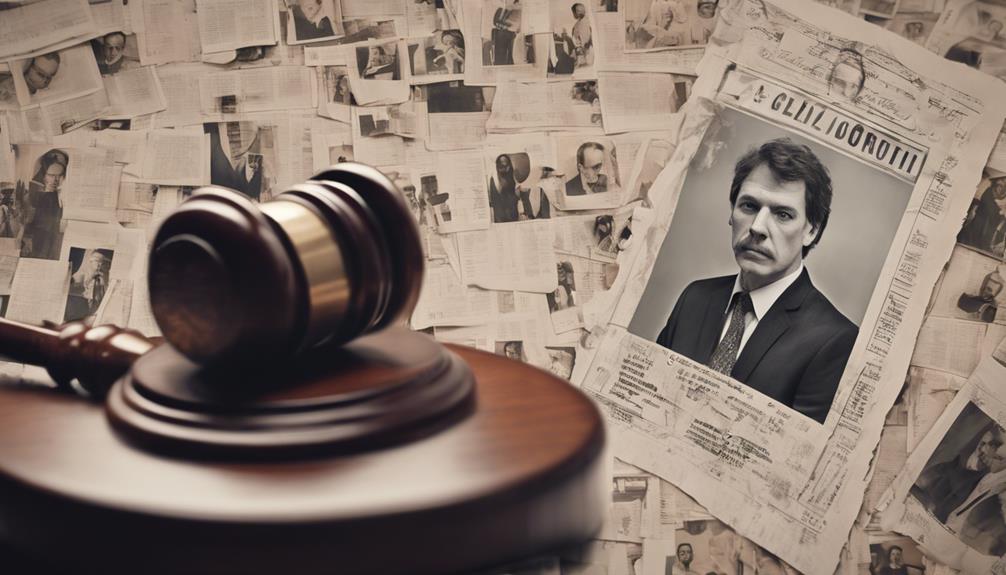
Media coverage exerts significant sway over public perception, often framing the narrative of celebrity trials and influencing attitudes towards the justice system. The portrayal of celebrities by the media can impact public opinion and potentially sway the outcome of high-profile trials. This is evident in cases like O.J. Simpson's, where parasocial bonds with the celebrity led to biased opinions and divided public opinion.
The visual representation of celebrities in the media, such as mugshots and news coverage, can also influence public opinion and preconceived notions. The influence of celebrities on public opinion underscores the complex relationship between media, celebrity status, and legal outcomes in high-profile cases.
As a result, the media's shaping of public perception can have a profound impact on the justice system, often blurring the lines between fact and fiction. By understanding the media's influence, we can better navigate the complexities of celebrity trials and make certain that justice is served.
The Power of Sensationalized Headlines
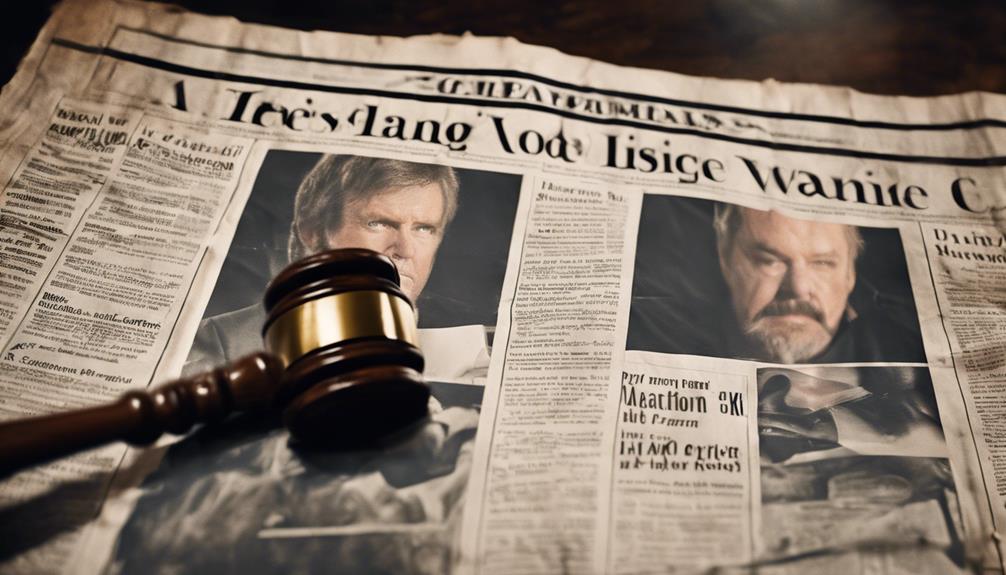
Sensationalized headlines, crafted to captivate and enthrall, exert a profound influence on public opinion, often blurring the lines between fact and fiction in high-profile celebrity trials. Media outlets often use provocative language and dramatic narratives to capture attention and drive viewership, creating a biased narrative that shapes how the public views high-profile cases.
Misleading or exaggerated headlines can influence how individuals perceive the legal proceedings and the individuals involved, ultimately swaying public opinion and perception of guilt or innocence. This sensationalized coverage in celebrity trials may prioritize entertainment value over factual reporting, impacting public understanding of the justice system.
As a result, the power of sensationalized headlines can create a distorted view of the legal proceedings, leading to a misinformed public opinion that can have serious consequences for the justice system. By crafting headlines that prioritize drama over accuracy, media outlets can inadvertently undermine the pursuit of justice.
Influence of Social Media on Jury Selection
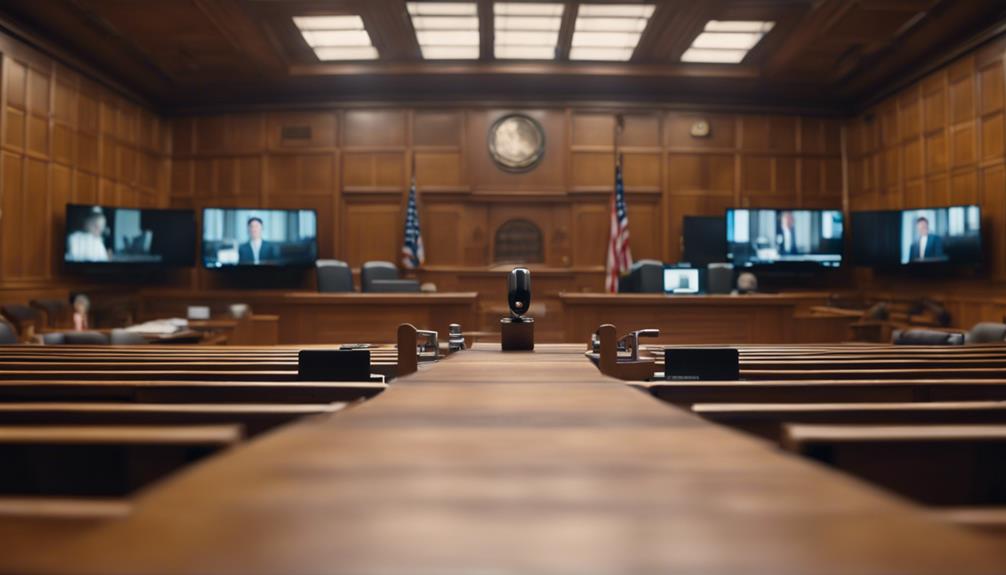
As the spotlight shifts from sensationalized headlines to the courtroom, the impact of social media on jury selection takes center stage, revealing a complex web of influences that can shape the trial's outcome. Social media presence can greatly impact jury selection by revealing potential biases or preconceived notions about a case. Lawyers may use social media to research prospective jurors, potentially influencing their decisions during selection.
Jurors' own social media activity can come under scrutiny to guarantee impartiality and fairness in the trial process. Social media can also provide a platform for public opinion to shape perceptions of a celebrity trial, potentially influencing jurors' views. This raises ethical considerations regarding privacy, transparency, and the potential for bias in the legal system.
The influence of social media on jury selection can compromise the fairness of celebrity trials, as public opinion and bias can seep into the courtroom.
The Impact of 24-Hour News Cycles
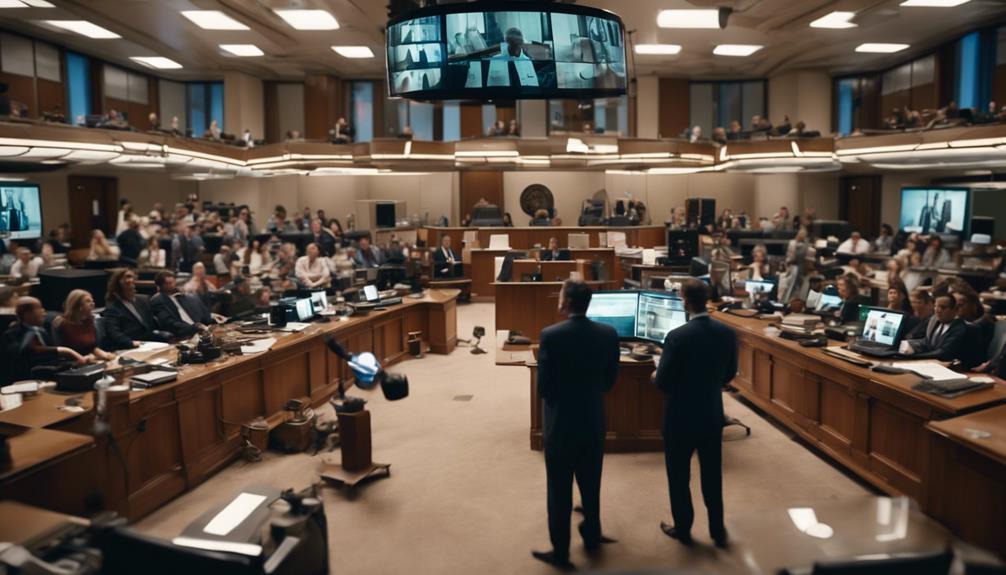
Constant coverage of celebrity trials through 24-hour news cycles creates a perpetual echo chamber, where public perception and opinion are relentlessly shaped and reshaped. This constant barrage of information amplifies sensationalized aspects of the trials, influencing public attitudes and biases.
As a result, media saturation creates a narrative that may impact the fairness of legal proceedings. The rapid dissemination of information through 24-hour news channels affects the outcome of high-profile cases, swaying public opinion and potentially impacting the judicial process.
The intense coverage in 24-hour news cycles can create a snowball effect, where public opinion builds upon itself, further shaping public perception. This can lead to a distorted view of the case, potentially tainting the jury pool and compromising the integrity of the judicial process.
Ultimately, the impact of 24-hour news cycles on celebrity trials can't be overstated, as they've the power to shape public opinion and influence the outcome of high-stakes cases.
Justice in the Age of Viral Content
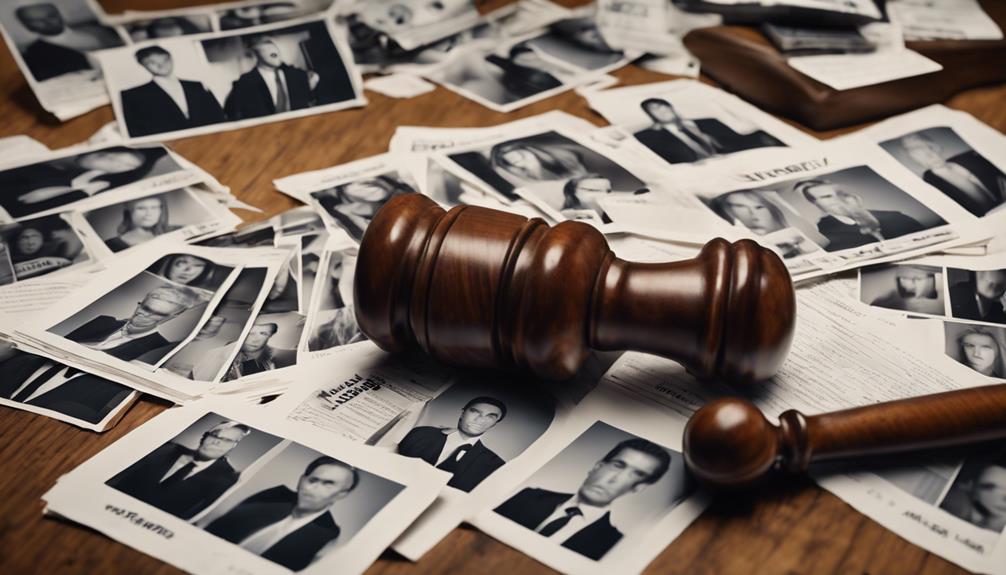
Viral content in the digital age has become a potent catalyst for shaping public perception of celebrity trials, with social media platforms serving as incubators for widespread discussion and debate.
Celebrity trials often attract intense media coverage, leading to widespread discussion and debate. Social media platforms play an important role in shaping public opinion during high-profile legal cases.
The influence of public opinion on celebrity trials highlights the intersection of media, justice, and societal attitudes. Public opinion can be swayed by sensationalized narratives and biased reporting in celebrity trials, which can, in turn, affect the justice system.
This phenomenon underscores the significant impact of viral content on the justice system, as it has the power to sway public opinion and, consequently, influence the outcome of celebrity trials.
As a result, it's essential to recognize the potential bias in media coverage and its subsequent impact on societal attitudes towards celebrity trials.
The Celebrity Factor in Trial Outcomes
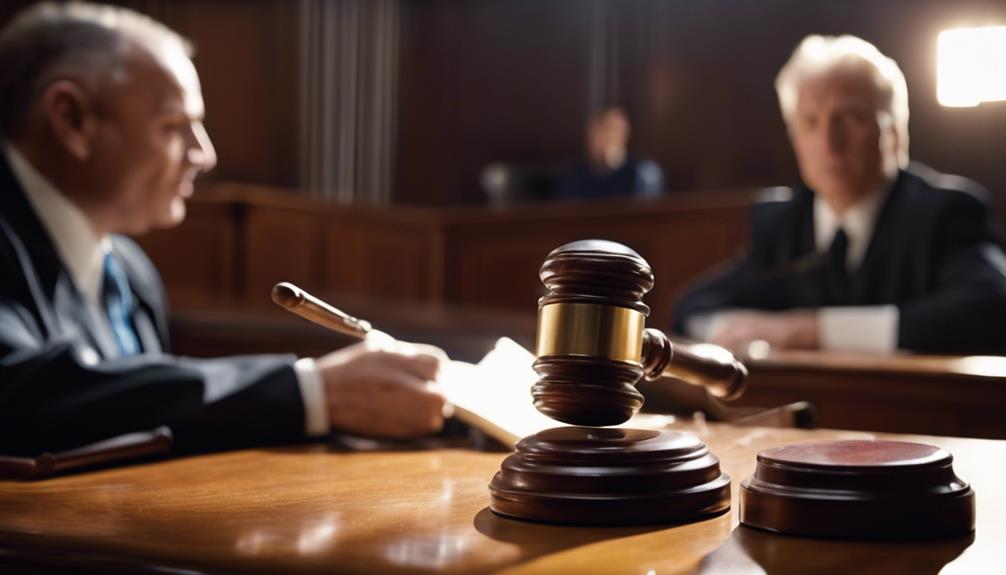
Celebrity involvement in trials can dramatically alter the trajectory of a case, as the public's perception of a celebrity's guilt or innocence is often influenced by their pre-existing parasocial bonds with the defendant. For instance, the O.J. Simpson case exemplifies how celebrity involvement can sway public opinion and impact trial outcomes greatly.
The media's portrayal of celebrities can create biased narratives that affect public attitudes and trial proceedings, influencing public opinion and ultimately, the justice system. Media coverage of celebrity trials can shape public perceptions, raising questions about fairness and impartiality in the legal system.
The influence of celebrities on public opinion in trials underscores the need for a more nuanced understanding of the intersection of media, celebrity culture, and the justice system. As the media continues to play a significant role in shaping public perceptions, it's essential to acknowledge the potential biases and make sure that justice is served impartially, unaffected by the celebrity factor.
When Public Opinion Trumps Evidence
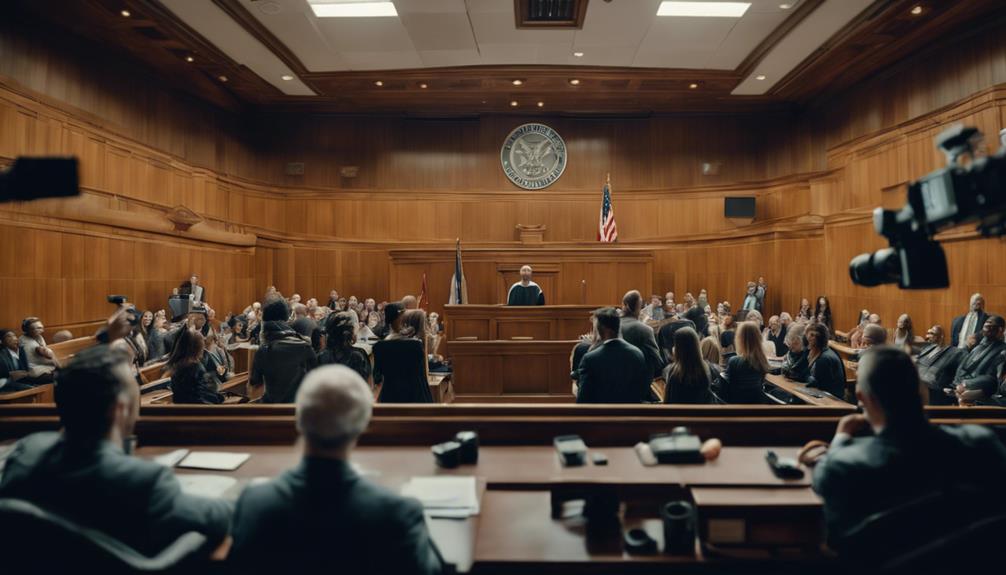
As high-profile celebrity trials unfold, public opinion often supplants concrete evidence, with media-fueled narratives and emotional appeals swaying the court of public opinion. This phenomenon can lead to a miscarriage of justice, where the pursuit of truth is overshadowed by the desire for drama and sensationalism.
| Case | Public Opinion vs. Evidence |
|---|---|
| O.J. Simpson | Public opinion favored acquittal despite DNA evidence |
| Casey Anthony | Media frenzy influenced public sentiment, affecting trial outcome |
| Michael Jackson | Accusations dominated headlines, despite lack of concrete evidence |
| R. Kelly | Public outrage preceded trial, potentially influencing jury decision |
| Harvey Weinstein | #MeToo movement's momentum impacted public perception of guilt |
In celebrity trials, public sentiment can significantly impact the judicial process and final verdict. The influence of public opinion on celebrity trials can lead to challenges in ensuring a fair and unbiased legal proceeding. As a result, the justice system struggles to separate fact from fiction, and the pursuit of justice is often lost in the noise of public opinion.
The Blurred Lines of Justice and Entertainment
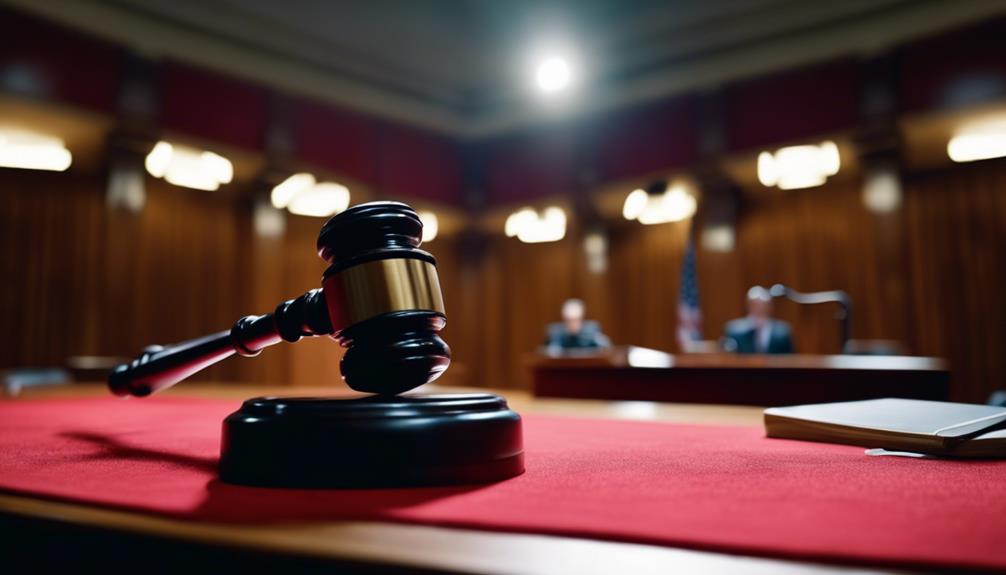
The intersection of celebrity trials and media coverage creates a blur between justice and entertainment. This convergence raises critical questions about the fairness and transparency of the judicial process. The pursuit of ratings and clicks can overshadow the pursuit of justice, shaping the public's perception of the legal system through sensationalized media narratives.
As a result, the lines between media frenzy and justice are increasingly blurred. Celebrities' trials become a form of entertainment that can sway public opinion and influence trial outcomes.
Media Frenzy Vs. Justice
Sensationalized media coverage fuels the blurred lines between justice and entertainment in celebrity trials, where public opinion often sways based on the media's portrayal of the celebrity defendant. The intense media frenzy surrounding high-profile cases can greatly influence the justice system.
Celebrity status can impact the perception of guilt or innocence in the eyes of the public during trials. The media's portrayal of celebrities can heavily impact the outcome of high-profile cases, as it shapes public opinion and, in turn, affects the justice system. This highlights the complex relationship between the legal system and media coverage.
The influence of public opinion on celebrity trials raises concerns about the fairness of the justice system. The media's significant impact on public perception can lead to a biased justice system, where the defendant's celebrity status becomes a decisive factor in the outcome of the trial. As a result, the lines between justice and entertainment become increasingly blurred, compromising the integrity of the justice system.
Trial by Social Media
Fueling the convergence of justice and entertainment, social media platforms have become instrumental in shaping public opinion on high-profile celebrity trials, where the instantaneous nature of online discourse often leads to swift judgments that can sway trial outcomes. Social media's impact on celebrity trials is undeniable, with public opinion heavily influenced by online discussions and commentary.
| Case | Social Media Impact |
|---|---|
| O.J. Simpson | Twitter users debated the verdict, sparking debates on racial bias in the justice system |
| R. Kelly | #MuteRKelly trended, influencing public perception of his guilt |
| Harvey Weinstein | #MeToo movement on social media amplified the case, shifting perceptions of guilt |
| Chris Brown | Online backlash against his actions led to public outcry and scrutiny |
| Michael Jackson | Social media tributes and debates on his legacy affected public opinion |
As a result, celebrities facing legal issues experience intense scrutiny and commentary on social media, which can amplify sensationalized narratives and affect perceptions of guilt or innocence in celebrity trials. This phenomenon, dubbed "trial by social media," highlights the blurred lines between justice and entertainment in high-profile cases.
Justice in the Spotlight
As the spotlight shines brightly on celebrity trials, the lines between justice and entertainment inevitably blur, sparking concerns about the integrity of the legal system. The media frenzy surrounding high-profile cases often raises questions about the fairness of the justice system.
Based on the intense media coverage, public opinion can heavily influence the outcomes of celebrity trials, potentially compromising the integrity of the legal proceedings. The intersection of justice, media, and public opinion is particularly evident in celebrity trials, where the pursuit of justice is often overshadowed by the entertainment value of the case.
The fairness of the justice system is called into question when public opinion, shaped by media coverage, influences the legal proceedings. This raises concerns about the ability of the justice system to deliver impartial verdicts, untainted by external influences.
Ultimately, the conflation of justice and entertainment undermines the credibility of the legal system, highlighting the need for a more nuanced understanding of the complex interplay between media, public opinion, and the justice system.
Frequently Asked Questions
How Does the Media Influence Public Opinion on Crime?
The media profoundly influences public opinion on crime by shaping perceptions and attitudes. Through selective reporting and sensationalism, the media can create a distorted view of reality, leading to misconceptions about crime rates and offender characteristics.
Additionally, the media's focus on violent and sensational crimes can create a sense of fear and anxiety among the public, further influencing their opinions on crime and justice.
How Does the Media Influence Trials?
The media's influence on trials is profound, often swaying public opinion and shaping perceptions of the justice system. Pretrial publicity can lead to prejudgment, with the media's framing of celebrity trials impacting attitudes towards the accused.
As legal scholar, John H. McWhorter, notes, 'The media's role in shaping public opinion can be devastating to the defendant.' This can result in biased attitudes, influencing the trial's outcome and undermining the fairness of the legal proceedings.
How Can the Media Influence a Person's Right to a Fair Trial?
The media's influence can compromise a person's right to a fair trial by swaying public opinion and creating bias among jurors.
Pretrial publicity can lead to prejudgment, making it challenging to select an impartial jury.
Additionally, the media's portrayal of the defendant can shape the public's perception of their guilt or innocence, potentially influencing the trial's outcome.
How Does the Justice System Involve Celebrities?
In ancient Greece, theatres hosted trials, where crowds influenced verdicts. Fast-forward to today, the justice system involves celebrities in various ways. They often testify as witnesses, are defendants, or even serve as jurors.
Celebrities like Oprah Winfrey, who served on a jury in 2004, or Michael Jackson, who was acquitted in 2005, have been part of high-profile trials. Their involvement generates significant public interest, sparking debate on the fairness of trials.
Conclusion
As the spotlight shines bright on celebrity trials, the influence of public opinion on justice can't be ignored.
A staggering 70% of Americans admit to forming opinions about a case based on media coverage, rather than evidence presented in court.
This phenomenon raises concerns about the integrity of the justice system, where the pursuit of justice is often overshadowed by the pursuit of ratings.
As one legal expert notes, "The court of public opinion can be a powerful force, but it's a double-edged sword that can both help and hinder the pursuit of justice."

